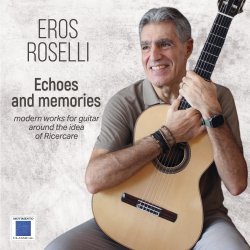
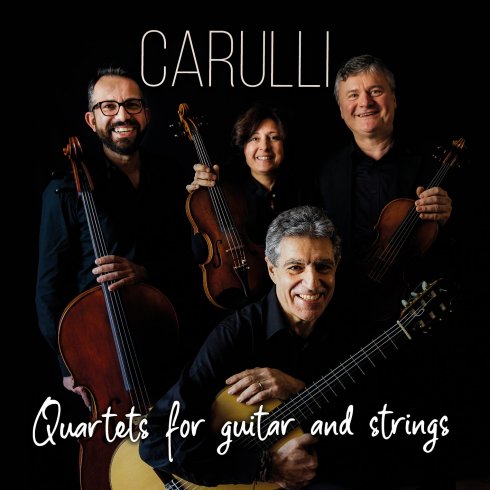
Quartets for guitar and strings
Carulli: Quartets for guitar and strings
Ferdinando Maria Meinrado Francesco Pascale Rosario Carulli was born in Naples on 9 February 1770 to Michele Carulli and Patrizia Federici, both non-musicians and presumably well-off. He approached music under the guidance of a clergyman who gave him cello lessons. As a self-taught man, he therefore devoted himself to the study of the guitar, lacking, in the second half of the 1700s, a literature and didactic apparatus such as to make it a worthy instrument.
At this time, the guitar underwent a decisive organological transformation by mounting no longer five doubled strings but six simple strings. In Naples the families of guitar makers Vinaccia and Fabricatore produced the new instrument around 1770, in advance of the luthiers of other European countries. Born in the period that the history of music includes as classicism, the simple six-string guitar thus earns the definition of "classical guitar". It enjoys a favorable environment in Naples due to the significant diffusion between the bourgeoisie and the popular classes of similar instruments such as the mandolin and the colascione. It is therefore very probable that this too has been an aid in favoring the rooting of a literature and a guitar practice that will be consolidated in the decades to come.
The musical world in Naples and Italy at the turn of the eighteenth and nineteenth centuries sees the prevalence of opera to the detriment of instrumental music not very present in concert seasons. Inevitable for Carulli, as it was for other contemporary guitarists (Mauro Giuliani, Fernando Sor, Dionisio Aguado, Francesco Molino, Matteo Carcassi…), to emigrate. After a short period in Vienna, where he evidently found the cumbersome competition of Giuliani, starting from 1808 Carulli settled in Paris, the capital of artistic life even in this era, where he remained until his death in 1841. Here the exuberant bourgeoisie animates musical life through the activity of publishers, buyers, organizers, amateurs, students… Ferdinando immediately stands out as an artist able of revealing the expressive and virtuosic resources of the new instrument to an ever wider audience. The Journal de Paris comments on one of his public concerts in 1809: “Never had the guitar reasoned under more skilled fingers; Mr. Carulli draws enchanting sounds from this instrument, which would be exchanged in turn for piano, harp and harmonica sounds ”.
Also taking advantage from the support and favor of nobles, wealthy bourgeois and members of the Napoleonic artistic circle, Carulli became a leading figure in the musical life of the Alps. Courted by numerous publishers, he publishes a large number of compositions for guitar and for guitar and other instruments. At the end of the 1930s Carulli will come to the publication of 366 opera numbers without counting the unnumbered compositions. In addition to Parisian publishers such as Carli, Pleyel, Lemoine, Naderman… his music was printed by great Austrian, German and Italian publishers such as Artaria, Haslinger, Schott, Breitkopf & Härtel and Ricordi.
We are faced with works that are often undeservedly unknown and without reprints in a modern edition. This is the case of the compositions present in this project. The quartets for guitar, violin, viola and cello op. 207 and 208 are still deposited in the edition of the time at the National Library in Paris. The same goes for the Nocturne op. 3b for violin and guitar and for the Variations on the Madness of Spain for solo guitar which can be found in the catalog of other European libraries. Only the Serenade op. 109 for violin and guitar has enjoyed the attention of modern publishers. In these works the stylistic code of Ferdinando Carulli stands out clearly. A stranger to romantic aesthetics, which took its first steps when Carulli had already consolidated both success and compositional style, he expressed himself with simplicity, enhancing the melody and avoiding dealing with harmony with the complexity that characterizes other authors of the time.

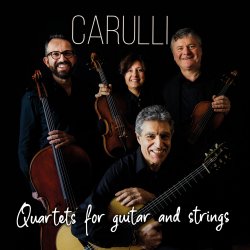
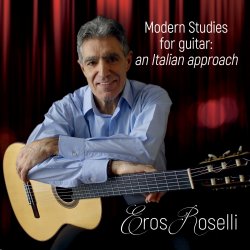
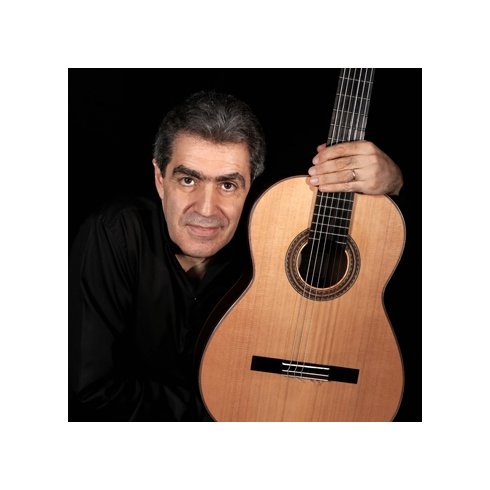
Eros Roselli
The guitarist Eros Roselli (promoter of the ensemble) studied with Ruggero Chiesa and won prizes and official acknowledgments at several competitions (Savona, Lagonegro, “F. Sor ”in Rome, Fundaciòn Guerrero in Madrid...). He has played a long series of concerts since 1985 and has held master classes in Italy, Switzerland, Germany, Austria, Spain, Croatia, Slovakia, Hungary, Lithuania, Russia, England, Denmark... American Record Guide wrote: “superb Italian guitarist Eros Roselli is a first-rate musician and he offers probing interpretations of even the most unassuming miniatures, employing his supple sense of phrasing, pristine articulation, and full tone to remarkably satisfying effect”.
Musician with multiple interests Eros Roselli has also been dedicating himself to composition for some years. Graduated in sociology at the University of Trento with a thesis on contemporary music, he is a guitar teacher at the Conservatory of Music in Padua. The experience gained in various institutional positions (including that of Director) led him to write a book on the reform of music conservatories titled “Exit from the ghetto?”, published in 2015 by Armando editore and a second work in 2018 entitled “Music and Conservatories”. Eros Roselli's activity is described in www.erosroselli.it.
